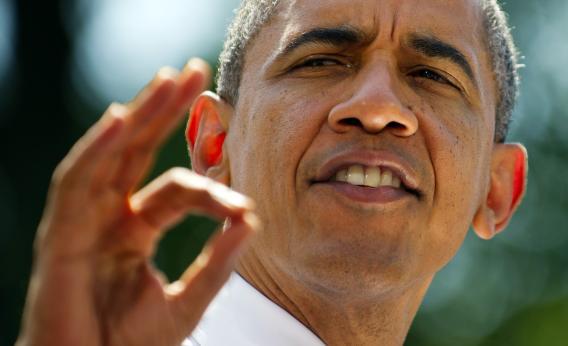Are you better off than you were four years ago?
As Republicans press that question, Democrats are fumbling for answers. The Democrats want to say yes, but they don’t want to offend voters who are unhappy or angry about the economy. The trick is to frame the question and answer it in a way that fits public opinion. Here’s a guide to what the polls say.
1. Remind them that things could have been worse. Gallup, CBS/New York Times, and AP-GfK surveyed Americans in the two weeks before the Republican convention. Gallup offered respondents two choices: “Would you say you and your family are better off than you were four years ago, or not?” Forty-two percent said they were better off; 55 percent said they weren’t. The CBS/Times poll offered a middle option: “Is your family financially better off today than it was four years ago, worse off financially, or is it about the same as it was four years ago?” Forty percent said they were the same, leaving 20 percent saying they were better off and 39 percent saying they were worse off. In the AP-GfK poll, 36 percent chose “about the same,” leaving 28 percent saying they were better off and 36 percent saying they were worse off.
Getting a “worse” rating from 36 to 39 percent of adults isn’t good for a president. But it isn’t nearly as bad as getting a “worse” rating from 55 percent. Clearly, it’s important to let people say that their economic circumstances are the same, not just better or worse—and to convince them that this middle grade is tolerable. This is why you see Joe Biden crowing that “General Motors is alive.” GM’s survival doesn’t show things getting better. It shows things staying the same when they could have gotten worse. Biden is trying to coax the 40 percent of Americans who see things as unchanged to be grateful for that state of affairs.
In an exchange on Sunday, Meet the Press host David Gregory told Rahm Emanuel, “Look at our poll: 69 percent, nearly seven in 10, saying things are either the same or worse than when the president came into office.” Really? In that August NBC/Wall Street Journal survey, 42 percent said the country was worse off, 27 percent said it was the same, and 31 percent said it was better off. The findings could just as easily have been aggregated the other way: 58 percent saying things are the same or better.
2. Adjust the start date. In June, Bloomberg and AP-GfK conducted simultaneous surveys of U.S. adults. AP-GfK asked, “Compared to four years ago, is your family’s financial situation better today, worse today or about the same as it was four years ago?” Bloomberg asked a slightly different question: “Are you better off or worse off than you were at the beginning of 2009?” You’d expect Bloomberg to get lower numbers for “better off” and “worse off,” since AP-GfK offered a third alternative (“about the same”), while Bloomberg didn’t. But that didn’t happen. While the number who said they were worse off was similar in the two polls (38 percent in AP-GfK, 36 percent in Bloomberg), the percentage who said they were better off was much higher in the Bloomberg poll (45 percent) than in the AP-GfK poll (27 percent).
That’s a huge difference. What could explain it? If you look at the questions, the obvious discrepancy is between “four years ago” and “the beginning of 2009.” That’s not a piddling distinction. From the summer of 2008 to the spring of 2009, the economy nosedived. Millions of people lost their jobs. That’s why the Obama campaign is laboring so hard to remind voters that Obama’s economic policies didn’t take effect until well into 2009. They don’t want to start the clock four years ago. They want to start it three years ago, after the worst of the plunge was over.
3. Mention Bush. Many polls indicate that while Americans hold Obama somewhat responsible for the economy’s troubles, they blame Bush more. In Gallup’s June survey, 52 percent of adults blamed Obama for the country’s economic problems, but 68 percent blamed Bush. In the July CBS/Times poll, 64 percent said Obama’s policies contributed at least somewhat to the economic downturn, but 81 percent said the same about Bush. In the April ABC/Washington Post sample, when adults were asked which president was “more responsible for the country’s current economic problems,” only 32 percent picked Obama. Fifty-four percent picked Bush.
That doesn’t mean Obama gets a pass on the “Are you better off” question. But it does affect the numbers. For proof, look at the survey CNN/ORC took in late May. As CNN’s political unit noted at the time:
When asked in the survey whether they are better or worse off than they were four years ago, Americans are split, 44% to 43%. But when asked whether they are better or worse off than they were four years ago “when Bush was president,” a small gap opens—47% say they are better off compared to 41% who say they are worse off.
In a neck-and-neck race, a shift of that magnitude—evidenced by two versions of a split-sample query in a single poll—can be the difference between defeat and reelection. “Are you better off” isn’t a simple question after all. The outcome hangs not just on how it’s answered, but how it’s asked.
Read the rest of Slate’s coverage of the Democratic National Convention.
